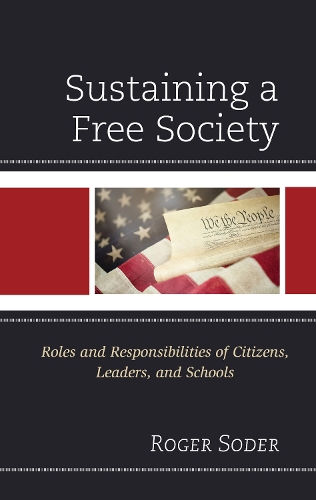
Sustaining a Free Society: Roles and Responsibilities of Citizens, Leaders, and Schools
(Paperback)
Publishing Details
Sustaining a Free Society: Roles and Responsibilities of Citizens, Leaders, and Schools
By (Author) Roger Soder
Bloomsbury Publishing PLC
Rowman & Littlefield Publishers
1st August 2021
United States
Classifications
Professional and Scholarly
Non Fiction
Philosophy and theory of education
Educational administration and organization
370.115
Physical Properties
Paperback
136
Width 154mm, Height 218mm, Spine 10mm
209g
Description
It is difficult to create a free society but even more difficult to sustain that free society over time. We want to sustain the esssential elements of a free society, but at the same time, we must recognize that the world is always changing. How, then, to adjust to changes and to improve what we have, without losing sight of core values, is our focus in Sustaining A Free Society.
The book first outlines in practical real-world terms fifteen conditions that must be in place to sustain a free society. One critical condition given extended consideration is the need for a long-term time perspective. Conditions do not exist in the abstract: they are created by people and the choices we make. Thus we need to consider the roles and responsibilities of those involved in a free a society: citizens and those they choose as leaders. We are not born knowing our responsibilities as citizens and leaders: these matters have to be learned. Sustaining a Free Society moves to a consideration of the role schools must play in ensuring that future generations know and value a free society and are prepared to in turn assume their responsibilities.
Reviews
A master teacher here reaches out beyond the classroom to the broader public. Writing plainly and clearly he makes the case for an enlarged understanding of the conditions that make it possible to create and sustain a self-governing people. And then, best of all, drawing on his own understanding and long experience, he shows how those who yearn not to be led by the nose can recover, deserve, and sustain their status as thoughtful citizens. No lessons could be more timely. -- Ralph Lerner, University of Chicago
Soder offers both rich philosophical underpinnings and concrete practical guidance in how we can reinvigorate our experiment in self-government. People working in and supporting schools will find here a wealth of insightful suggestions for a curriculum for civic education as well as a persuasive rationale for its necessity. This book is essential for anyone who cares about sustaining a free society and it could not be more relevant for our times. -- Spencer Welch, longtime teacher, school administrator, and educational consultant
Soder raises the critical question: What are our roles and responsibilities to each other in order to truly deserve a free society Our public schools have as a fundamental purpose preparing students to participate in and contribute to a free society. And it is in this context that this book has particular value. Soder has crafted a book with practical value to teachers and administrators, moreover one that should be considered mandatory reading for school board members and others concerned with school policy and direction. -- Bill Mester, retired school district superintendent
This book is not about them or others in blue states, red states, in government or in administration on whom we blame our leadership challenges. It is about all of us, and what wae can do in everyday settings including neighborhoods, workplaces, public and private institutions, and particularly in our schools. In compelling and forthright prose, Soder explores the habits of the heart and mind that enable us to envision and live in a free society, as we nurture aspects of freedom in our society, ourselves, and each other. -- Ed Taylor, Dean and Vice Provost, Undergraduate Academic Affairs, University of Washington
Author Bio
Roger Soder, Professor Emeritus of Education, University of Washington, has worked for many years with community advocacy organizations and K-12 schools on equity and access issues in addition to his teaching, research, and writing on the interconnected issues of leadership, rhetoric, democracy, schools, and teacher education. He is the author of The Language of Leadership, editor of Democracy, Education, and the Schools, and co-editor of Developing Democratic Character in the Young.
